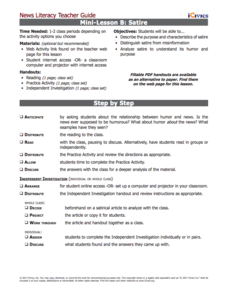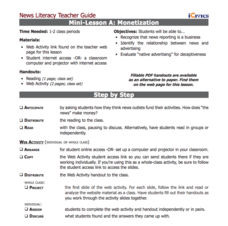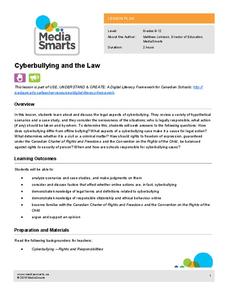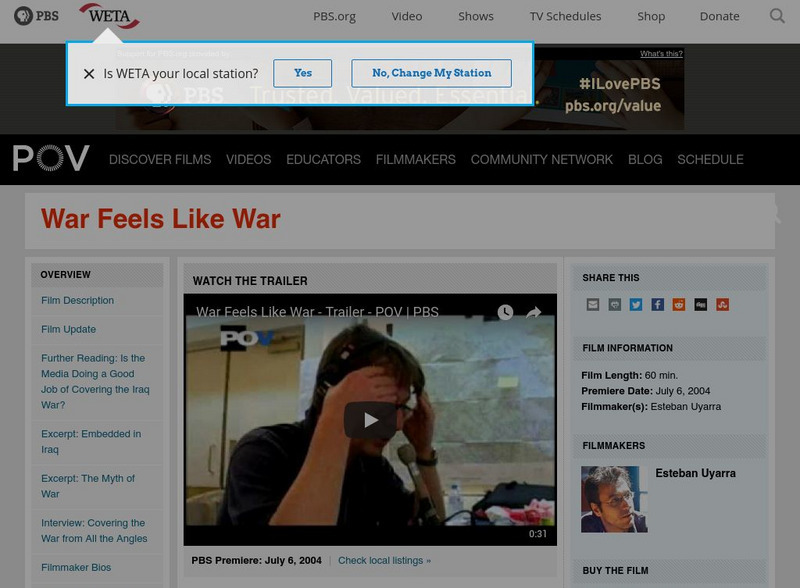iCivics
Mini-Lesson B: Satire
Hey, what's so funny? Explore the use of satire in a variety of media with a hands-on instructional activity. Fourth in a five-part journalism series from iCivics, the activity introduces satirical language in print and online. Pupils...
iCivics
Lesson 2: Misinformation
Fake news is a hot topic right now ... but what is it? Intrepid young investigators track down the facts that separate journalistic mistakes and misinformation through reading, research, and discussion. Part three in a five-lesson series...
iCivics
Mini Lesson A: Monetization
Advertising is everywhere! Does your class know that their attention span is for sale, even when they're watching a simple news story? The second installment in a five-part series from iCivics examines the relationship between news...
iCivics
Lesson 1: Journalism
Extra! Extra! Do your pupils know what it takes to be a good journalist? Young news hounds explore the world of journalism through a series of activities that focus on ethical reporting. Learners read, evaluate, and investigate popular...
PBS
Journalism Ethics
As a journalist, would you publish everything you heard or saw? Discuss the ethics of journalism with a lesson from PBS. Young reporters imagine themselves to be the editor of their school's newspaper, and as they read five scenarios,...
PBS
Facts vs. Opinions vs. Informed Opinions and their Role in Journalism
Do reporters write about what they see, or what they think? Examine the differences between investigative writing and opinion writing with a lesson from PBS. Learners look over different examples of each kind of reporting, and convince...
University of the Desert
Do Journalists Shape or Report the News?
Analyze the presence of negative stereotypes and biased reporting in news media, and how this affects one's understanding of other cultures. Learners read newspaper excerpts and quotes from famous personalities to discuss the power of...
Media Smarts
Cyberbullying and the Law
Research, role-playing, and reflection are the three “R’s” that form the basis of an examination of Cyberbullying. Although based on the Criminal Code of Canada, the included scenarios and case studies provide valuable resources for a...
Media Smarts
Bias
See how bias operates firsthand. Half of the class reads one article while the other half reads another article on the same event. The obvious differences emerge when the two sides talk about their observations though. Several handouts...
Curated OER
Law & Ethics for Photojournalists
Students identify and discuss First Amendment rights, examine how to make sound legal judgements regarding photographs of private individuals, examine difference between public and private figures as far as libel law is concerned,...
Curated OER
The First Amendment, What it Means and When Libel Comes in to Play
Students research three topics: The First Amendment, John Peter Zenger and his trial, and libel. In this journalism and libel lesson, students discuss things authority figures have done they disagree with and the anit-sedition law....
Curated OER
Worksheet #56 Questions - Judicial Terms
For this American judicial terms worksheet, students examine their knowledge through ten fill in the blank questions that relate to the aforementioned topic.
Curated OER
on Trial: Anonymous Sources, Promises of Confidentiality And Privacy
Students research the case of Matthew Cooper and Judith Miller, two reporters found in contempt of court for failing to divulge their sources. They participate in a mock trial as they consider the case from various points of view.
PBS
Pbs News Hour: To Report or Not to Report
What kind of principles do reporters adhere to when deciding what to report? This lesson takes a closer look at a piece written to the New York Times regarding the atrocities committed by Saddam Hussein's Regime in Iraq.
Other
Society of Professional Journalists: Ethics
The text of Society of Professional Journalists' code of Ethics. Created by media ethicist Jay Black, Ph.D., the site includes links to resources and information of SPJ's ethics hotline.
Other
Society of Professional Journalists: Code of Ethics
The complete text of the Code of Ethics by the Society of Professional Journalists.
PBS
Pbs Teachers: American Photography: A Century of Images (Teacher's Guide)
Access five lesson plans developed for this PBS documentary series on twentieth-century American photography. Lessons encompass research, discussion, a variety of hands-on activities, and extensions that will help young scholars examine...
PBS
Pbs News Hour: The Ethics of Embedded Journalists (Lesson Plan)
Directions for helping learners identify the ethical problems and issues that confront embedded reporters, their editors, and their television networks and for discussing the "picture" of war that embedded journalists paint.
PBS
Pbs News Hour: On Trial: Anonymous Sources (Lesson Plan)
A lesson in which learners investigate issues of journalistic ethics revolving around the reporting of leaked information, promises of confidentiality, and the public's right to know. Learners also conduct a mock trial, attempting to...
PBS
Pbs Teachers: Unspoken Words of Media Ethics (Lesson Plan)
A lesson that takes young scholars through an exploration of the codes of ethics for journalists and the unspoken rules that govern the media and the news we hear. Students also examine the ethical dilemmas faced by reporters.
PBS
Pbs News Hour: Rules of Engagement: The Geneva Convention (Lesson Plan)
A lesson in which students examine the agreements stipulated by the 1949 Geneva convention. They then assess if the Iraqi media's use of POW images is or is not contrary to the tenets of the convention. Students will also discuss the...
PBS
Pbs Teachers: War Feels Like War: Journalism in War Time (Teacher Resources)
Assess a lesson plan that revolves around the role of journalists in a democracy, especially considering the challenges and ethics of reporting from a war zone. Should broaden student understanding of Thomas Jefferson's ideal of an...
PBS
Pbs: Legal and Ethical Aspects of Reality Television (Lesson Plan)
A lesson to help students understand the basic legal and ethical responsibilities involved in making reality videos. Requires access to an episode from "American High," the documentary aired on PBS about high school students from Chicago.




















